Violence against students: ENOUGH!

Police patrol. Paramilitary fly and fire. Army amble amid curfew. Smokes lick the sky. Shrieks and screams can be heard from many places. A slow-motion mayhem is all set. The horror unleashes. They cry. They sigh. They die. Clashes and confrontations renew. Bullets still pierce. Blood still drips. Bodies still drop. The atmosphere is spooky.
This is not a scene from a horror movie. This is what unfurled in Bangladesh during the third week of July. We are jinxed since. A part of the whole state apparatus appears to be up against its student populations. They are brutally killed and fatally wounded. No one knows exactly how many students have already perished. Victims, including civilians, are legion. As of July 30, The Daily Star confirmed 163 deaths. No student movement has been attempted to be quelled by any government since our independence in 1971 that costs so many lives. This is perplexing, paralysing!
Shockingly, a disconnected voice reminds us that the government has deployed only five percent of its power to deal with the defectors, who are the agents of anarchy. They (read: the government) don't own up to the terrible mess that the country is now. They look for scapegoats. They swagger around like saints and angels, whose failure is someone else's fault. Whatever they did, and do, bolsters democracy and fosters development. Rigged elections don't bother them. A muzzled press doesn't embarrass them. Epic corruption charges against government officials seem to them infractions of a slapstick proportion. They ignore. Consequently, the potential for crime, corruption, and discrimination metastasises. People feel divided and vulnerable. They yet stand no criticism. When they encounter a conflict with their beliefs, values, and vision, they become confrontational and condescending. They trot out labels for othering. One of the common labels they almost religiously drizzle is Razakar—the traitor. This time around, the label fell on the wrong ears, and exploded agitations nationwide.
And that's how we've reached where we stand now. Students from universities across the country were protesting against the quota system in civil service. On July 21, the Appellate Division of the Supreme Court ordered that 93 percent of jobs in civil service will be merit-based. Case closed!
If it were! The country simmers in anger and uncertainty, for, in the meantime, what the government did went against every rule. Patience and negotiations were not their currencies of reconciliation. They threatened repression. They lauded the muscle power of their student wing. Nothing seemed enough to deflect the students from their demands. The government pulled the levers of power immediately. Police swung into action. They appeared exhausted. Paramilitary chipped in. The chaos confounded. The army took over the streets. Curfew continues. Helicopters whir. Guns roar. Sound grenades blast. Whoever lives here, as it seems, lives by luck. Many are not lucky enough against guns and goons. Death sneaks around for anyone, everyone. Why did the government pit itself against its student populations when some of them are not voters yet and most of them are disinterested in politics? They are off to the wrong genies. Students mustn't have been the excuse for the government to lock everyone down in their houses.
The government proceeded from the assumption that they would weather the crisis and would come out strong, as they did in the past with protests and movements. Their tactics and rhetoric seemed tested. They appeared invincible. Abu Sayed, a student of Begum Rokeya University in Rangpur, punctured their aura of invincibility. Abu Sayed was killed live on July 16. He stood open-air with a stick in his hand, pretending to dodge a fusillade of rubber bullets. The bullets hit hard. He collapsed to the ground. He bled profusely and lost consciousness before he perished on his way to the hospital. The nation witnessed how state-sponsored violence crushed innocence and courage to maintain its grip on power. People panicked. Anger intensified. The protests were no longer confined to public universities. Students from private universities, colleges, and schools joined. The whole country seemed implicated. The country that emerged subsequently was not the country we thought we knew.
Why did the students have to protest to compete for government jobs on the basis of merit? Jobs are one of the primal needs that a functional country ensures to its citizens. While the country is awash in rhetoric of development, the unemployment rate is still staggeringly high in Bangladesh. Jobs here mean government jobs, given the perks and privileges attached to them. Approximately 400,000 candidates apply for 3,000 positions in the civil service in Bangladesh each year. Such a system also contributes to causing discrimination in social, economic, and political structures by disrupting equilibrium. Students realised that, as did everyone. When, however, the government realised it, it was already too late. The country already paid " such a heavy price," when it finally acquiesced to the students' demand, as Sushmita S Preetha, in her pitch "Did we have to pay such a heavy price for this verdict?" in The Daily Star, claims. It's a sobering time for the country now.
I have never felt so helpless and useless thus far in my life. I wonder what it means to be a teacher in the face of such a crisis. The more I commit to my country, the more I feel connected to my students. I'm deeply invested in helping them forge their future so that the country marches forward. Now that they are on the streets and their lives are endangered, grief and guilt consume me. During the protests, we saw authority without leadership from the merchants of dreams. Whose dream was that nightmare? They used such a big knife to cut such a small political cake. I wish they were more patriotic and political. Their hubris was puzzling!
That upsets me. The country hangs on a cliff to go further south. Every infrastructure totalled, every life perished, and every drop of blood spilt are provocations for further division and destruction. A sledgehammer approach to turning the country on the right track is apparently a recipe for disaster. When Bangladesh bleeds, no one scores any political point, however lofty their political ideologies are. The student movement demonstrates that we lose as a nation when we fight for political space and prestige amid traumas and tragedies. I apprehend times of dread ahead. Toni Morrison claims, referring to her friend, in her essay, "No Place for Self-Pity, No Room for Fear," that this is precisely the time for artists to go to work. Teaching is the art of cultivating wisdom and ethics. Being a teacher, I'm an artist. With prayers and tears, as I resolve to resume my work, I implore everyone to stop bleeding Bangladesh.
It's already ENOUGH!
Dr Mohammad Shamsuzzaman is associate professor at the Department of English and Modern Languages in North South University (NSU).
Views expressed in this article are the author's own.
Follow The Daily Star Opinion on Facebook for the latest opinions, commentaries and analyses by experts and professionals. To contribute your article or letter to The Daily Star Opinion, see our guidelines for submission.

 For all latest news, follow The Daily Star's Google News channel.
For all latest news, follow The Daily Star's Google News channel. 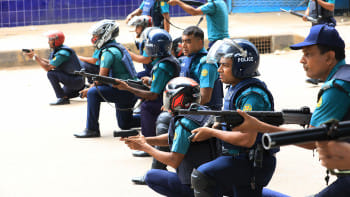
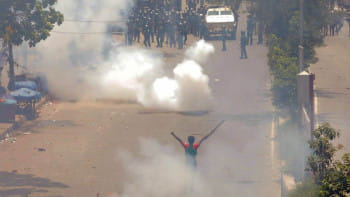
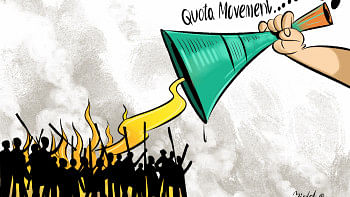



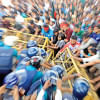
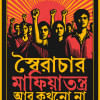


Comments